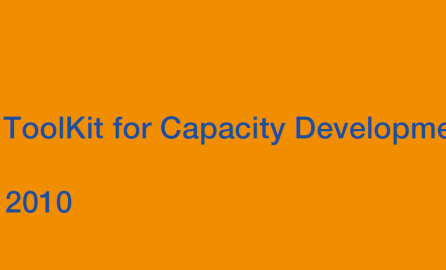
The Accra Agenda for Action (AAA) mentions capacity development (CD) not less than 16 times. So CD certainly succeeded in securing a strong position on the agenda. But how do all these words get turned into action?
Well-orchestrated lobby work may pay off. That was at least what happened for the "CD-lobby" up to Accra. They organised a carefully crafted workshop in Bonn leading to the "Bonn Consensus" which again found its way into the AAA.
The CD agenda that came out of Accra can be summarised in six points:
1) Civil society and private sector: Enable local civil society and the private sector to play their role in capacity development.
2) National, sector, and thematic strategy: Ensure proper integration of capacity development priorities in key national, sub-national, sector and thematic strategies.
3) Technical cooperation: Work towards demand-driven efforts in technical co-operation and promote use of local and regional resources.
4) Enabling environment: Address the systemic impediments that detract from local capacity development.
5) Country systems: Assess, strengthen and promote the use of country systems to implement policies and manage public resources.
6) Fragile situations: Tailor, phase and coordinate capacity building and development in situations of fragility, including countries emerging from conflict.
A well-meaning declaration is one thing, but converting the promise of CD into meaningful joint actions among donors and country partners is quite another hurdle.
To make this leap, several activities are firmly in place. But it will remain a continuous challenge to move from global platforms, networks and concepts to enhanced practice at country and sector level and ultimately feed this enhanced practice back into global learning.
Three initiatives are worth mentioning here, (acknowledging that they are not the only ones):
i) The OECD's Development Assistance Committee is mobilising donor agencies
OECD/DAC has a cross-cutting CD work stream pursuing two objectives: support for a more coherent international partnership and promotion of institutional coherence within the OECD. An inventory of donor approaches to CD has just been published, a "CD correspondent's network" has been established and internal learning events have been conducted for staff in OECD on integration of CD in their work streams.
ii) A Southern-led CD Alliance has been formed
Led by the co-chair of the Working Party on Aid Effectiveness, Talaat Abdel-Malek from Egypt, the "CD alliance" was formally launched in a meeting in Berlin in May. It convenes senior level officials from the South (all continents are represented) with the purpose of strengthening the Southern voice in support of appropriate CD and CD support. The CD Alliance includes selected donor representatives to ensure that Southern voices are heard, including the head of EuropeAid, Koos Richelle.
iii) The Learning Network on CD (LenCD)
LenCD, www.lencd.org, has a five to six year old history as an informal network of CD practitioners from donor agencies, developing countries, civil society and the private consultancy sector. Recently, LenCD strengthened its structure under the umbrella of a UNDP project, to enable the network to promote learning activities regionally, in countries and in sectors (see the flyer on CD learning ). Pending the processing of administrative matters, LenCD will thus shortly be able to organise and fund, specific CD learning activities on the ground.
All these activities - and many more - are still in the making, and still largely concentrated at the global level. The platform www.Capacity4Dev.eu will follow these activities as they evolve, serving as a bridge between the daily practice in donor-partner cooperation and global processes.
You can further discuss the issue in this dedicated "Discussion Forum" on Capacity Development







Log in with your EU Login account to post or comment on the platform.